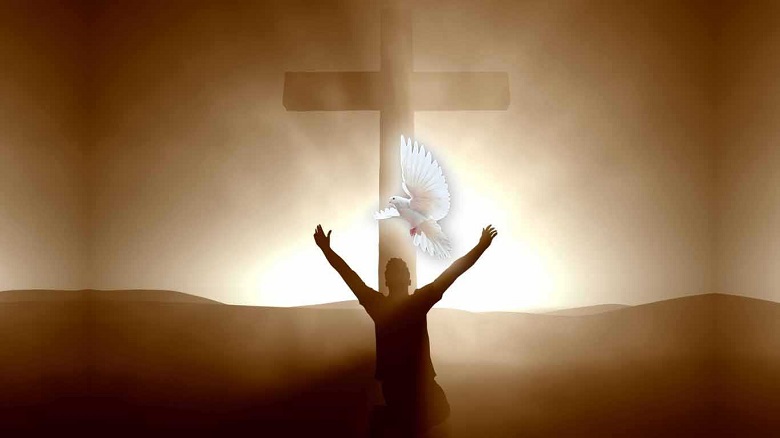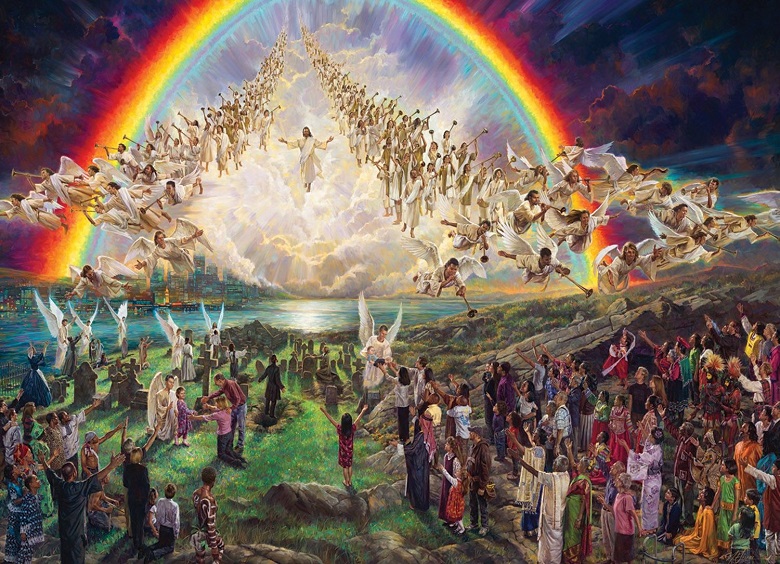Do you know why the Psalm 2 is known as the drama of the centuries? Enter here and learn this and much more about this wonderful verse from the Bible.

Psalm 2
The word psalm comes from the Latin language psalmus and it is attributable to compositions that serve to praise God. Psalm 2 was written by King David 1000 years before the Lord Jesus Christ came to Earth. It describes the future rebellion against the Son of God. This means that it is a prophetic psalm.
The context David was living in at the time he wrote this Psalm is not known. However, we must remember that this king had to face many persecutions, rebellions and conflicts. However, Psalm 2 projects much further.
In the New Testament, the Evangelists and Apostles made reference to this psalm in the New Testament. It is a psalm that was projected into the future. It reveals to us the opposition that the Messiah would revive when he came to Earth. It also reveals to us the triumph that God will have over all opposition, by receiving all the nations of the Earth as an inheritance. This psalm exhorts the authorities of the Earth to honor God.
What has been said so far allows us to conclude that Psalm 2 is a Messianic Psalm, since it anticipates what the person of Jesus and his ministry would be like. To reaffirm this approach we are going to contrast this psalm with the Ministry of Jesus.
The Jews had this psalm at their disposal, but they did not make this comparison that would have allowed them to identify the Messiah.
Modular
We can clearly identify four structures, organized in a harmonic way, that present a common thread or line of prophetic thought about the reign of God.
Part I
It is made up of the first three verses dealing with the rebellion against the Anointed One, the Son of God. He had to assume that the Jews would receive the Messiah with joy, however, Psalm 2 anticipates that it would not be so. The Jews rejected Jesus. They hardened their hearts against the Son of God.
Psalm 2: 1-3
Why do people riot?
And the peoples think vain things?2 The kings of the earth will arise,
And princes will consult together
Against Jehovah and against his anointed, saying:3 Let's break your bonds,
And let's cast from us their ropes.
David begins by describing a universal rebellion against God's Anointed, by referring to all nations he anticipates that he is referring to Jesus. Now, we can ask ourselves why the Jews did not receive the Lord? The psalm warns us that he would be rejected and this responds to a plan of God (John 1:11-12; Isaiah 53:1-12).
Isaías 53: 1-12
Who has believed our ad? And upon whom has the arm of Jehovah been revealed?
2 It will rise like a branch before him, and like the root of dry earth; there is no appearance in it, no beauty; we will see him, but without attraction so that we want him.
3 Despised and rejected among men, a man of sorrows, experienced in brokenness; and as we hid his face from him, he was despised, and we did not esteem him.
4 Surely he bore our sicknesses, and suffered our pains; and we considered him scourged, wounded by God and dejected.
5 But he was wounded for our rebellions, crushed for our sins; the punishment of our peace was upon him, and by his stripes we are healed.
6 All of us like sheep have gone astray, each one has turned to his own way; but the Lord laid on him the sin of us all.
7 Distressed he, and afflicted, he did not open his mouth; as a lamb he was led to the slaughter; and as a sheep before its shearers, he was silent, and did not open his mouth.
8 By jail and by trial he was removed; and her generation, who will tell? Because he was cut off from the land of the living, and for the rebellion of my people he was wounded.
9 And he laid his grave with the wicked, but with the rich he died; Although he never did evil, there was no deception in his mouth.
10 With all that, Jehovah wanted to break him, subjecting him to suffering. When he has laid down his life in atonement for sin, he will see lineage, he will live for long days, and the will of the Lord will be prosperous in his hand.
11 You will see the fruit of the affliction of your soul, and you will be satisfied; By his knowledge my righteous servant will justify many, and bear their iniquities.
12 Therefore, I will give him a share with the great, and with the strong he will divide the spoil; because he poured out his life unto death, and was numbered with the sinners, having borne the sin of many, and prayed for the transgressors.
Since the arrival of Jesus we can appreciate the opposition that the kings of the Earth had against the Anointed One. At birth, we know the militia deployment that Herod ordered to kill infants from 0 to 2 years old.
On the other hand, we know that Jewish religious groups persecuted Jesus. The scribes and Pharisees were declared enemies of the Messiah. So much was the persecution against Jesus, that it took him to the cross of Calvary. The people rioted around the cross, those people who received healings, miracles were the same population that prosecuted him and raised their voice to have him crucified, this persecution reaches what we know as the passion, death and resurrection of the Lord.
In the following link we describe, in detail, the sufferings that the Lord suffered on the cross Passion death and resurrection of Jesus.
On the other hand, we recommend that you read the phrases that Jesus mentioned during his crucifixion and the secret that each of them contains in the link titled Sermon of the 7 words
Continuing with the analysis of the rebellion against the Anointed One, the first Christians, his disciples recognized that Psalm 2 was referring to Jesus.
Facts 4: 24-28
24 And they, having heard it, raised their voices with one accord to God, and said: Sovereign Lord, you are the God who made heaven and earth, the sea and all that is in them;
25 that through the mouth of David your servant you said:
Why do people riot?
And the peoples think vain things?26 The kings of the earth assembled,
And the princes were gathered into one
Against the Lord, and against his Christ.27 For indeed Herod and Pontius Pilate, with the Gentiles and the people of Israel, were united in this city against your holy Son Jesus, whom you anointed,
28 to do what your hand and your advice had previously determined to happen.
Here we can see that the authorship of Psalm 2 is attributed to David, but that the events described in that biblical passage referred to Jesus. When he talks about the nations of the world we can appreciate the Jews, the Sanhedrin as the religious authority of the Israelites, as well as Pilate who represents the Roman empire that had conquered the nations that were known.
Until today, the Jews see Jesus as a stumbling block, the Muslims reject the Jew and even attack his disciples. However, our Lord's answer is:
Lucas 11: 23
23 He who is not with me is against me; and he who does not gather with me, he scatters.
Now, as for David's question of astonishment, he expresses sadness, lack of understanding and disbelief that humanity rejected a God who loves him and wants his protection and care. We can find this same question in other prophets (Micah 6:3; Jeremiah 2:5) It is incomprehensible that humanity rejects the government of God.
Humanity has launched different models of development that have led to the destruction of the planet. There is no model of human government that has been able to provide timely responses to the needs of humanity. However, we insist on rejecting God, with an agitated and even violent resistance against God.
In addition, the problem of humanity is to perceive the Word of God as chains that curtail human freedom or control of their own lives.
Ultimately, this rebellion against God will lead us into a great battle against God led by the Antichrist. This rebellion has been a point that has not changed since man sinned against the Lord.
Part II
The second part can be seen in verses 4-6 which refers to God's reaction to this human rebellion. God honors his Son by placing him in the highest place, on the highest Throne.
Psalm 2: 4-6
4 He who dwells in heaven will laugh;
The Lord will mock them.5 Then he will speak to them in his fury,
And he will trouble them with his anger.6 But I have put my king
On Zion, my holy mountain.
In this section we can see that the scenario changes. Now events unfold in heaven. The Sovereignty of God prevails. It reminds us who sits on the Throne in heaven (Psalm 11:4; Isaiah 40:23-24)
There has been no government, empire that has managed to impose itself on Earth and remain forever. Throughout history we can appreciate the end of the great empires and their authorities (Hebrews 12:22-24; Psalms 110:1)
God dignified Jesus by raising him and glorifying his Son to heaven and has seated him on the Throne of God.
Part III
We can visualize the third part in verses 7-9 where God definitively establishes his Kingdom, led by his Anointed, the Son of God. Not only does God give him the Throne in the Kingdom of Heaven, but also his Kingdom will be established here on Earth and he will rule those peoples and nations that had rejected him.
Psalm 2: 7-9
7 I will publish the decree;
Jehovah has said to me: My son is you;
I begot you today.8 Ask me, and I will give you the nations as an inheritance,
And as your possession the ends of the earth.9 You will break them with a rod of iron;
Like a potter's vessel you will crush them.
In this section it is the Messiah himself who speaks. We rule out the possibility that it was David, since the Jewish king died and his tomb still contains his remains (Acts 2:29). Pedro himself rules out this possibility.
On the other hand, none of David's direct heirs could be the one to assume the inheritance of all nations. Let us remember that the sons of David, some were murderers, others conspired against their father, Solomon himself departed from the Law of God, but referred to someone much greater, with a divine nature (John 1:18; Matthew 3: 17; Mark 9:7; Hebrews 1:5-14).
When referring that he is begotten, it means that he is of the same divine nature. To say that Jesus was created falls theologically because the Father was a father at the same time that the Son was a son. Therefore, neither is prior to the other. To speak of being begotten is not a term in the context of the flesh, but spiritual.
In this spiritual context, the act of begetting is clarified at the beginning of Psalm 2, since the Son already existed and had to be rejected on Earth. So the term beget refers to the moment when the Son is resurrected and the ascension and enthronement of Jesus in heaven (Acts 13:32-33).
Facts 13: 32-33
32 And we also announce to you the gospel of that promise made to our fathers,
33 which God has fulfilled for their children, for us, by resurrecting Jesus; as it is also written in the second psalm: You are my son, today I have begotten you.
Having crucified Christ means the public declaration of humanity to show that Jesus was a blasphemer and was not the Son of God. However, by resurrecting Jesus on the third day, having been ascended to heaven and sitting on the Throne at the right hand of the Father is the public declaration of the Decree that recognizes Jesus as his Son; This is what the term beget refers to (Romans 1:3-4).
The good news is that in the face of adversity and the bad governments of men that have led to the decline of the planet, and has not been able to provide answers to the problems of humanity, the Lord Jesus will rule on Earth with a rod of iron. (Philippians 2: 9-11). Man is compared to a potter's jar that will be shattered with a blow, that is, God's judgment is coming on Earth.
Part IV
Finally, we can appreciate in verses 10 to 12, the exhortation that God makes through the psalmist to humanity, to reconcile with the Anointed God before it is too late and judgment comes.
Psalm 2: 10-12
10 Now then, O kings, be wise;
Admit admonishment, judges of the earth.11 Serve the Lord with fear,
And rejoice with trembling.12 Honor the Son, so that he does not get angry, and you perish on the way;
Because suddenly he inflamed his anger.
Blessed are all who trust in him.
Already in this section, God calls humanity to put down this attitude of rebellion because whoever raises his voice and fist against God will not be able to prosper. The first coming of Jesus was for the purpose of bringing salvation, the second will be to judge the nations.
As we have warned, this psalm tells us about the second coming of Christ and the final victory of the Son of God (Revelation 19:11-16). Jesus is already ruling in heaven, but his coming is near to judge.
Apocalypse 19: 11-16
11 Then I saw the open sky; and behold, a white horse, and he that sat on it was called Faithful and True, and with justice he judges and fights.
12 His eyes were like a flame of fire, and on his head were many diadems; and he had a name written that none knew but himself.
13 He was dressed in clothing dyed in blood; and his name is: THE VERB OF GOD.
14 And the heavenly armies, dressed in the finest linen, white and clean, followed him on white horses.
15 Out of his mouth comes a sharp sword, to smite the nations with it, and he will rule them with a rod of iron; and he treads the winepress of the fury and wrath of God Almighty.
16 And on his garment and on his thigh he has this name written: KING OF KINGS AND LORD OF LORDS.
It is time to reconcile with God, because he extends his grace and mercy to us on the cross of Calvary. At this point, what the Lord means is that we recognize his Son, accept his rules, his laws in our lives. He exhorts us to do his will. Serve him with reverence, honoring the Son, worshiping him, following him.
Humanity is at a crossroads, it must choose the path of blessings or curses (Deuteronomy 28:1-69; 30:1-20)
The attitude of humanity that God expects is to trust in the Lord. This message was left to us by the Lord Jesus Christ in the sermon on the mount on the beatitudes. To deepen the attitude, way of life that we must assume until Jesus arrives, we invite you to read the following link entitled the sermon on the mount
In order to complement this study on Psalm 2, we leave you this devotional that deals with the message contained in this psalm with a prayer included.












